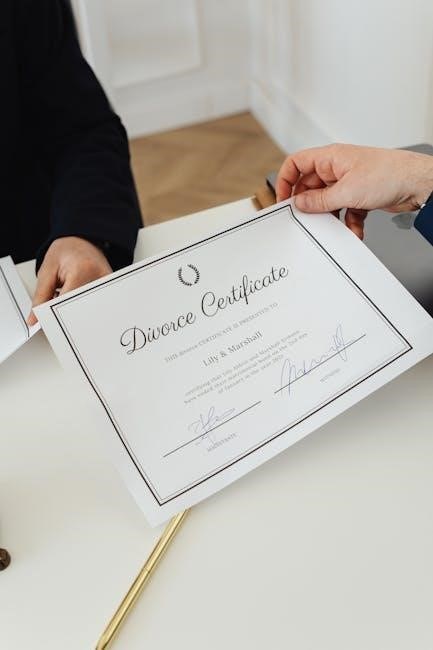Colorado divorce papers are essential for initiating and formalizing the dissolution of marriage․ They ensure legal compliance, protecting both parties’ rights throughout the process․ Accurate completion and proper filing are crucial for a smooth divorce proceeding․
1․1 Overview of Divorce in Colorado
Divorce in Colorado is a legal process that dissolves a marriage, requiring specific forms and adherence to state laws․ Colorado is a no-fault state, meaning neither party must prove blame․ The process involves filing paperwork, meeting residency requirements, and addressing issues like property division and custody if applicable․
1․2 Importance of Using Official Forms
Using official Colorado divorce forms ensures compliance with state legal standards, preventing delays or dismissals․ These forms are designed to cover all necessary legal aspects, ensuring accuracy and validity․ They help protect both parties’ rights and streamline the divorce process, making it easier to navigate without legal complications․
Where to Find Colorado Divorce Papers in PDF Format
Colorado divorce papers in PDF format are available through the official state court website, legal aid resources, and third-party legal document providers․ These sources offer accurate and up-to-date forms․
2․1 Official State Court Website
The official Colorado Judicial Branch website is the primary source for downloading free, official divorce forms in PDF format․ These documents are regularly updated to ensure compliance with state laws․ Visit the site, navigate to the “Forms” section, and use the search bar to find specific divorce-related forms․ Ensure you download and print the most recent versions for your case․
2․2 Legal Aid Resources
Legal aid organizations in Colorado provide free or low-cost assistance with divorce papers․ These resources often include downloadable PDF templates, step-by-step guides, and legal advice to help individuals complete and file their divorce forms accurately․ They cater to those who cannot afford legal representation, ensuring equitable access to legal processes․
2․3 Third-Party Legal Document Providers
Third-party providers offer Colorado divorce papers in PDF format, simplifying the process․ These services typically include completed forms tailored to individual circumstances, ensuring compliance with state requirements․ They are a convenient option for those seeking efficiency and accuracy without legal representation․
Required Divorce Forms in Colorado
Colorado requires specific forms for divorce, including the Petition for Dissolution of Marriage, Case Information Sheet, Financial Affidavit, and Parenting Plan if applicable․ These documents ensure legal compliance and proper handling of marital issues․
3․1 Petition for Dissolution of Marriage
The Petition for Dissolution of Marriage is the initial document filed to begin a divorce in Colorado․ It outlines the grounds for divorce, requests relief, and provides basic case information․ Both parties’ details and marital circumstances are included․ This petition must be signed and notarized, marking the formal start of the legal process․
3․2 Case Information Sheet
The Case Information Sheet is a required document summarizing the divorce case details․ It provides an overview of the parties, case type, and issues in dispute, such as custody or property division․ This sheet helps the court manage the case efficiently and ensures all necessary information is readily available․
3․3 Financial Affidavit
The Financial Affidavit is a critical document requiring detailed disclosure of both parties’ financial situations․ It includes income, expenses, assets, liabilities, and employment information․ This affidavit ensures transparency, aiding the court in fair decisions regarding property division, spousal support, and other financial matters during the divorce process․
3․4 Parenting Plan (if applicable)
The Parenting Plan outlines custody arrangements, visitation schedules, and decision-making responsibilities for children․ It ensures the child’s best interests are prioritized, providing stability and clarity for both parents and the child․ This plan is mandatory when minors are involved and must be approved by the court during the divorce process․

Filing Divorce Papers in Colorado
Filing divorce papers in Colorado involves submitting completed forms to the court, either electronically or in person․ Proper filing ensures the legal process begins correctly and efficiently․
4․1 Electronic Filing Options
Colorado offers electronic filing (e-filing) for divorce papers through its official court portal․ This method streamlines the process, allowing parties to submit documents securely online, reducing delays, and ensuring timely court processing․ It’s a convenient option for those preferring digital submissions․
4․2 In-Person Filing Process
Filing divorce papers in person involves visiting the local Colorado courthouse where the case will be heard․ Bring all completed forms, copies, and required fees․ Court staff will review and accept the documents, providing a stamped copy for your records․ This method ensures immediate submission and confirmation of receipt․
4․3 Filing Fees and Payment Methods
Colorado divorce filing fees vary by court but typically range between $230 to $400․ Payment methods include cash, money orders, credit cards, or personal checks․ Ensure correct payment to avoid delays․ Fees may be waived for eligible individuals based on income guidelines, requiring a separate application submission․

Serving Divorce Papers
Serving divorce papers in Colorado involves delivering legal documents to your spouse․ Courts require proof of service, ensuring your spouse is notified․ Proper service is essential for proceeding with the divorce case efficiently and legally․
5․1 Methods of Service
In Colorado, divorce papers can be served through personal delivery by a process server, certified mail, or publication in a newspaper if the spouse’s location is unknown․ Proper documentation and proof of service are required to ensure legal validity and proceed with the divorce process efficiently․

5․2 Proof of Service Requirements
Proof of service must be filed with the court to confirm delivery of divorce papers․ This typically involves a signed affidavit or certificate from the process server․ The document must detail the method, date, and recipient’s identity to ensure compliance with Colorado’s legal standards for valid service․

Legal Requirements for Divorce in Colorado
Colorado requires at least one spouse to reside in the state for 30 days before filing․ The marriage must be deemed irretrievably broken, with a 91-day waiting period from filing to finalization․
6․1 Residency Requirements
In Colorado, at least one spouse must reside in the state for 30 days before filing divorce papers; Residency is typically proven with a valid ID or affidavit, ensuring jurisdiction for the case․
6․2 Grounds for Divorce
Colorado is a no-fault divorce state, meaning neither spouse must prove misconduct․ The grounds for divorce are typically stated as an irretrievable breakdown of the marriage․ If both parties agree, they can jointly state the marriage is irretrievably broken without assigning blame․
6․4 Waiting Period
Colorado does not have a mandatory waiting period for divorce․ However, the final decree cannot be issued until at least 91 days after the petition is filed․ This timeframe allows both parties to address all issues before the divorce is finalized․

Understanding the Divorce Process Timeline
The Colorado divorce process timeline includes filing, serving papers, and awaiting responses․ The duration varies, typically ranging from a few months to over a year, depending on case complexity․
7․1 Filing to Serving Papers
Filing divorce papers in Colorado initiates the legal process․ After filing, the next step is serving the documents to the spouse, typically within 21 days․ Personal service or certified mail is required, ensuring the respondent receives official notice to respond within 21 days of being served․
7․2 Response and Negotiation Phase
Once papers are served, the respondent has 21 days to file a response․ This phase involves negotiations between both parties, focusing on issues like property division, custody, and support․ If agreements are reached, a settlement can be drafted and submitted to the court for approval․
7․3 Final Hearing and Decree
The final hearing concludes the divorce process․ The court reviews the settlement agreement, ensuring fairness and completeness․ If approved, a divorce decree is issued, legally ending the marriage․ Both parties may need to attend․ The decree outlines terms and responsibilities, finalizing the dissolution of marriage in Colorado․
Common Questions About Colorado Divorce Papers
Common questions include whether an attorney is needed, if filing can be done online, and the typical duration of the divorce process in Colorado․
8․1 Do I Need an Attorney?
Hiring an attorney is not mandatory but highly recommended, especially for complex cases involving children, assets, or disputes․ Legal expertise ensures proper form completion and representation․ However, Colorado offers resources for self-filing, making it possible to handle straightforward cases independently with careful preparation and adherence to court requirements․
8․2 Can I File for Divorce Online?
Colorado allows online filing of divorce papers through its electronic court system․ This option streamlines the process, reducing time and paperwork․ Eligibility depends on case complexity, with uncontested divorces being the most suitable․ Ensure all forms are complete and compliant before submitting them digitally through the state’s authorized platform․
8․3 How Long Does the Process Take?
The duration of a divorce in Colorado varies, typically ranging from 3 to 12 months․ Uncontested cases are faster, often finalized within 3-6 months, while contested cases may take longer due to disputes and court delays․ Complexity of issues and court schedules also influence the timeline․

Additional Resources and Support
Colorado offers legal aid services, counseling, and online forums to support individuals through divorce․ These resources provide guidance on forms, emotional support, and community connections to navigate the process effectively․
9․1 Legal Assistance Options
Colorado provides legal aid services, including free consultations and document preparation assistance․ Nonprofits and legal clinics offer guidance on completing divorce papers, ensuring accuracy and compliance with state requirements․ These resources help individuals navigate the legal process efficiently and confidently․
9․2 Counseling and Mediation Services
Colorado offers counseling and mediation services to support individuals through divorce․ These services help couples resolve conflicts amicably, particularly regarding child custody and property division․ Mediation can simplify the legal process, reducing costs and emotional stress, while ensuring fair agreements for all parties involved․
9․3 Online Communities and Forums
Online communities and forums provide valuable support and resources for individuals navigating divorce in Colorado․ These platforms offer advice, shared experiences, and access to legal information, helping users understand the process and connect with others facing similar challenges․

Final Checklist for Completing Divorce Papers
A final checklist ensures all Colorado divorce forms are accurately completed and submitted on time․ This step-by-step guide helps verify document accuracy, preventing delays and ensuring legal compliance․
10․1 Ensuring All Forms Are Completed
Review each Colorado divorce form to confirm all sections are filled out accurately․ Missing information can delay the process, so double-check for completeness and legibility․ Ensure signatures are properly notarized where required, adhering to Colorado’s legal standards for document submission․
10․2 Reviewing for Accuracy
Thoroughly review all Colorado divorce papers for accuracy․ Verify personal details, financial information, and custody arrangements․ Ensure all data aligns with submitted documents and legal requirements․ Correct any errors promptly to avoid delays or legal complications during the divorce process․
10․3 Submitting on Time
Submit your Colorado divorce papers by the designated deadline to avoid case dismissal․ Ensure timely filing with the court clerk, either electronically or in person․ Late submissions may delay the process, so prioritize adherence to the court’s schedule for an efficient resolution of your divorce case․